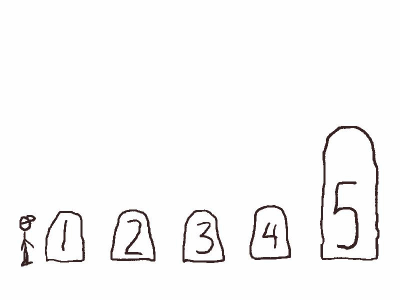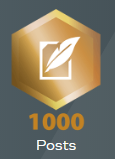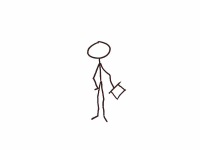Let's leapfrog a bit. @forexbrokr wrote a very interesting post on NFTs recently, I then wrote a reply #1 then a reply #2, and @arcange wrote a response to me. Arcange got me to thinking, I wanted to reply, but felt a full post might be a more fitting and proper format. So, I'm here.
I counted four leapfrogs there and now I'm about attempt a number 5 leap over a giant of an arcfrog.
Which reminds me of a wise maxim I once heard: never play leapfrog with a unicorn.

Background
I think this post may need a bit of background to fully make sense.
- If you want the full background, you might read the links above. Arcange's reply to me I actually pasted below since this is mostly a response to that.
- Also, my pertinent views of NFTs and my NFT ponderings include whether Hive posts are NFTs and...
- ...my view that NFTs can be defined as "verified, unique, ownership.
This would be the full backstory if you have time to burn.
David and Goliath
I'm not smart, but I'm not dumb enough to take on arcange when it comes to something technical and computery like NFTs. He's a Goliath and I'm a little David. That said, I suppose I am kinda dumb enough in that I'm still going to choose a few stones to sling and take him on. Truth be told, I think what we're both saying is mostly the same, maybe only in different ways.
In his reply to me, arcange politely offered to:
complete your thoughts about uniqueness and ownership.
Okay, this is good, my thoughts usually need completion. I liked his explanation because I like real world analogies that I can hang abstract concepts like NFTs onto. My two posts above have several such analogies built in (a vinyl record, stadium seat tickets, the Mona Lisa).
Source being responded to
Because @arcange's reply is the basis for what I'm writing, I'll include his words here for context (again, here's the source). Hopefully Hivewatcher's won't bust me:
I will complete your thoughts about uniqueness and ownership.
An NFT allows for creating a "link" between an "object" and its "owner".
But we could also imagine links between an object and multiple owners. The ownership of the object is then shared among them. Think of two persons (husband and wife) who own the same house, the ownership being represented by an NFT. If the NFT is transferable, each owner can sell their share of ownership to someone else.In this case, uniqueness applies to the link only, not the object.
We have seen artists selling their digital art as NFTs and allowing up to N copies of the same "image" to be owned by several buyers.In the same way, when it comes to Hivebuzz, we also have users "owning" the same "1000 posts" badge. The badges are identical but each link to a user is unique.
About "ownership", you are right. As we do not generate a transaction in the blockchain when attributing a badge to someone, the "ownership" by itself is not verifiable. Although we generate a notification each time a badge is given to users, sometimes we can't do this when the user doesn't have any posts (curation bots for example)
Brain glitch on ownership
My brain didn't want to wrap itself around his analogies at first, or during my first three or four readings. But, a couple of synapses glitched when I read about the husband and wife analogy. Same with the digital art analogy. Something didn't seem right.
Not sure I agree with the ownership take, or perhaps I don't understand. As I see it...
We've got a husband and wife and an NFT that represents ownership of an object (the house). I humbly think this analogy is flawed, if I understand correctly. The flaw is that one NFT is representing ownership. In this way, ownership is by them together as a group..it is one entity, comprised of individuals, owning the house/object. That's fine. That entity can hold it or sell it. In my view, the flaw appears when one person sells their share.
I think of the word "people" and how it can be in a singular form, like how all the folks who live in Boston are a people of that great city. When the people own a land like Boston Commons, it is collective ownership. But, suppose Willie thinks Boston Commons is a dumb idea, he'll never use it, wants no part of the it, and says he'll just cash out his share of the Commons. But, Willie cannot sell his individual share of Boston Commons.
If an NFT represented the Commons Willie is out of luck. If each person had an NFT for their own share of the commons, Willie could sell his Commons-NFT-share of ownership. In this way, he is not selling the Commons, the actual land, or "object" as you say, of course. He's selling his share of ownership.
In the husband/wife example, you say each can sell their share (say, wife sells her half). In this way, she is selling her 50% ownership of the house. He retains his 50% ownership. One NFT cannot do this, it would require two NFTs. Each NFT would represent a half-share of a house. What's more, and this is an odd way to look at it, but each NFT represents complete, 100% ownership of that half-house-share.
Each house-half-share is unique in that mint 1 is house-half-share #1 and mint 2 is house-half-share #2. The uniqueness comes from the ability to look at the blockchain and verify that, "Yes, mint 1 contains the metadata stating this NFT represents ownership of house-half-share #1. And it's owned by husband." And, "Mint 2 contains the metadata stating this NFT represents ownership of house-half-share #2. It was owned by wife, but then sold to John Doe."
Of course, mint 1 is not saying he gets the first floor of the house and mint 2 does not say she gets the second floor. It's a 50/50 split in terms of value. The object remains untouched. But still, the NFTs are unique.
So, you're saying there's a chance
Pertaining to HiveBuzz badges/NFTs and ownership, I'm still not entirely convinced. Your words make me think even more and I suppose I'm wrestling with the concept. Maybe...
If I had a "1000 post" badge from HiveBuzz, I have it because of an achievement I made. If I wanted to really dig into the blockchain, I could prove I made 1000 posts. HiveBuzz could remove my pretty badge image if they wished. But, my accomplishment is still there...I still own that. (When I was a kid, I did 10 pull-ups. I got a ribbon, I think. I've lost that ribbon since, but I still own that accomplishment.)
I titled this post "When you buy an NFT, what are you buying?" and that comes back to mind here. When you get a HiveBuzz NFT, maybe it's really the accomplishment that you own, verified by your activity on chain, not so much the little image badge thingee that symbolizes it.
Another thought occurred to me, I wondered, "How can I own something if someone else can take it away?" My other NFTs are protected by my private keys...someone can't take it away. How's that badge mine if HiveBuzz could poof it away whenever they wished? But, I answered my own thinking, "I own a car. If someone stole it, I am still the owner." Plus, badge or not, I still own the accomplishment.
So, regarding ownership, I still don't know, but maybe there's a chance.
Unique
In my "reply #2", I said HiveBuzz NFTs did not meet the "uniqueness" qualifier. I'm now thinking I was wrong on this and arcange is right. The fact that the image is the same is immaterial. Lots (most) of NFTs have the same image, but they are still unique NFTs. I focused on the fact that normally the metadata recorded on chain defines the uniqueness of an NFT. With HiveBuzz, you can't click the badge and read the metadata. But, I'm okay with the fact that it's possible to use the username/account and connected activity to determine what makes my "1000 post" badge different from user XYZ. I hadn't thought of it that way.
Hmm.
Regarding the idea of artists selling N number of NFTs for their art.
selling their digital art as NFTs and
Yes! This is it! Buyers are buying digital art NFTs.
allowing up to N copies of the same "image" to be owned by several buyers.
No. I don't believe buyers own a copy of the image. They own the NFT with a nice photo to look at. The NFT is the "object" owned, not the painting.
Buyers are not buying copies of the same image. Instead, they are buying unique NFTs that share the same image. As to owning a share of a painting, an artist may sell 10 shares of "Green Apple" still life. There would be 10 NFTs, each representing at 10% ownership stake in the painting. Like the husband/wife, owning an NFT means I own 100% of my 10% share. (I think we're saying the same thing here only in slightly different ways.)
I often read or hear the wrong-thinking like, "Why would I buy an NFT of the Mona Lisa? I can download a copy." When someone buys an NFT with the Mona Lisa image, they're not buying the image, they are buying an NFT with a pic to look at. If they were to right-click save as and download the image, they are not getting an NFT. They are definitely not buying and getting the real Mona Lisa, the object, via either NFT or download. With the NFT, they are buying the uniquely different NFT (the different mint number).
Yes, NFTs very often share the same image, but they are not the same NFTs. Sally's front row seat to the World Cup final is not the same as my nose-bleed seat. Both tickets share the same image of a soccer ball and both get us into the stadium, but the unique numbers differentiate them. I ask myself, "When people buy those tickets, what are they actually buying?"
Possible answer A: They're buying the card stock paper that it's printed on. Both are exactly the same. Therefore, the tickets should have the same price. Umm, no, they're not buying the paper. And, yes, the price should be the same if they were actually just buying the paper.
Possible answer B: They're buying their own copy of the same image of a soccer ball that's printed on the front of the ticket. Therefore, the tickets should have the same price. Umm, no, they're not buying an image. And, yes the price should be equal if they were actually just buying the picture.
Possible answer C: They're buying the right to enter the stadium for the game. Since either ticket gets you into the game, the tickets should be the same price. Yes, the right to enter is what they're buying. But, no, the price should not be the same. Since the tickets are non-fungible (they're clearly not identical), their prices should be different.
Possible answer D: They are buying (a) the right to enter the stadium and (b) the right to sit in a specific section. So, the ticket prices should be different. (a) Yes and (b) yes. And yes to different prices.
D is the correct answer. When people buy the tickets, they are not buying the same image. They do not collectively own the image printed on it or a share of the image printed on it. They are really buying and owning the same ability to get into the stadium, but with different privileges (better view, comfy seats, etc.).
Conclusion
With regards to HiveBuzz badges as NFTs...
- When a person gets a "1000 posts" badge, the image is the same for everyone who met this criteria. In this way, the NFT is the same. This is normal, lots of NFTs look the same.
- Verified - yes, we can check the blockchain
- Unique - yes, what makes uniqueness with a HiveBuzz badge is the "link" between the image and the username/account. Via blockchain, each of those 1000 posts would be entirely different from any other user's badge/image/NFT.
- Ownership - maybe - the achievement of 1000 posts is owned, the NFT/badge, I don't know, but there's a chance.
Anyway, I appreciate the HiveBuzz badges, they're fun and a good thing for Hive. Correct me where I'm wrong @arcange and slap me back across the frogs, I can handle it.
Final note, while writing this, I wondered, "How many posts do I actually have?" http://hivebuzz.me/@crrdlx tells me I have 1000 posts and I do have that badge. I didn't know that 'til now. Nice!

:)

Not on Hive? The top benefits of the Hive blockchain: (1) no ONE person/group runs it, (2) YOU own and control your content, and (3) YOU earn the rewards that your content generates. Learn more or consider using my referral link to get your free account here and I'll support you as you begin. Alternately, you can see other options here.
Posted Using LeoFinance Beta
